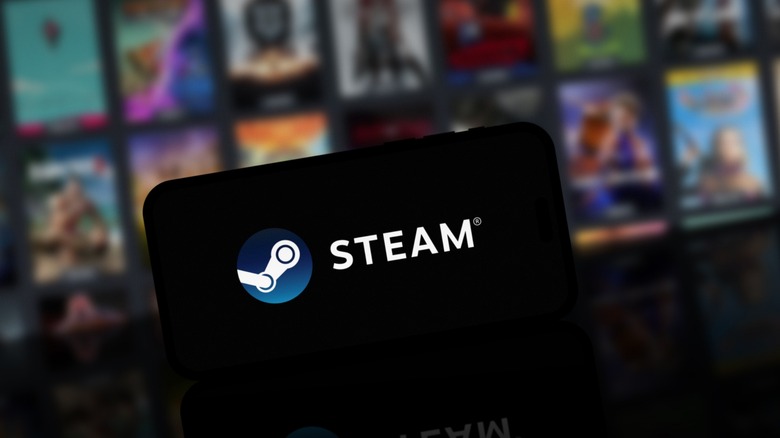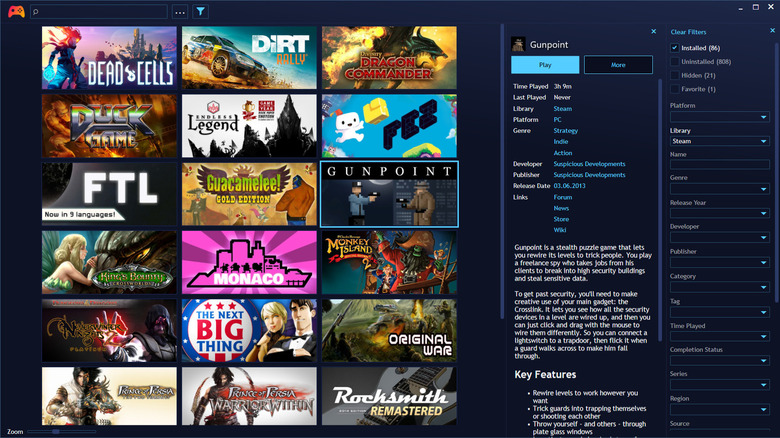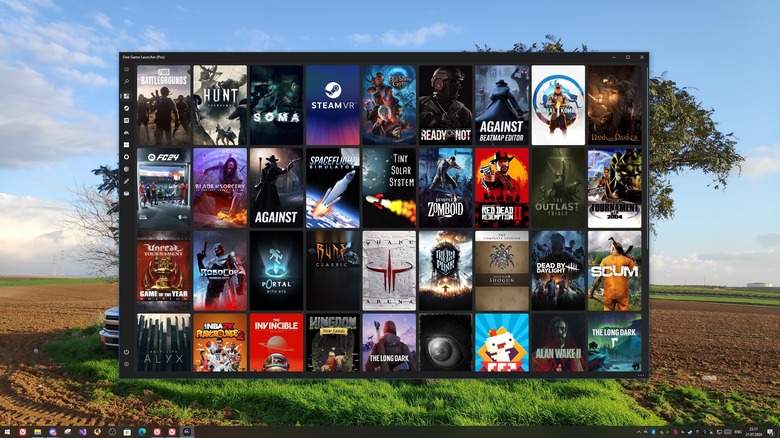These Apps Make It Easy To Organize Your Digital Game Collection Fast
If you're primarily a PC gamer, then odds are good you do the majority of your gaming day-to-day on Steam. However, while Steam is definitely the most ubiquitous PC gaming platform, it's definitely not the only one. Competing platforms like the Epic Games Store, as well as publisher-specific platforms like Origin, Ubisoft Connect, and Battle.net, are all vying for space on your PC. If you've purchased and regularly play games on all of these platforms, keeping track of everything can become a real headache, to say nothing of DRM-free straggler games picked up here and there.
If you're tired of manually adding and removing games from other platforms to your Steam library in an effort to keep everything straight, it might be time to try a bit of an organizational overhaul. For this purpose, there are several major apps available that will get your entire digital game collection in order in a hurry: Playnite, One Game Launcher, and GOG Galaxy 2.0 library organization apps that will help to future-proof your overall gaming experience alongside regular hardware updates. These apps serve similar purposes of getting all of your games across multiple platforms in a single place, though they go about it in subtly different ways that could have an effect on your overall experience.
Playnite's open-source design is wide-reaching with a bit of tinkering
If you're a PC gamer, you're probably no stranger to the occasional bout of tinkering to get your games working the way you want. If you don't mind doing a little extra work under the hood, you may get more out of Playnite, a wholly open-source video game library manager designed to unify as many disparate libraries and services as possible as conveniently as possible.
Playnite doesn't have its own logins to manage, with no user data stored anywhere but your own local storage. With a combination of user-built plugins and existing credentials, you can synchronize game libraries from major services like Steam and the Epic Games Store, as well as smaller storefronts and services like Fanatical, itch.io, and Meta Quest.
What's especially nice is that thanks to metadata plugins, every game you add to your library will have a similar breadth of information to Steam, such as genres, developer information, and cover art. Thanks to a link to IGDB, any missing cover art is automatically added for recognized games, something you would normally have to do manually on Steam. Playnite does take a bit of work to get just the way you want it, but once everything is set up, it'll keep all of your libraries consistent, and with a fairly small footprint on your processor.
One Game Launcher is a simple widget for Windows devices
If you're a die-hard Windows fan and prefer to keep as much of your app usage as possible localized to the Microsoft Store, don't worry. There is a library organization app available on the Microsoft Store called One Game Launcher, which is designed to unify your digital games across multiple platforms and present all of it as a single, seamless widget.
One Game Launcher can be run from your regular Windows start menu and launched as a widget on the Windows Game Bar, allowing you to quickly call up your games in either circumstance. You can integrate libraries from several major platforms, including Steam, Epic Games Store, GOG, Battle.net, and, of course, the Microsoft Store and Game Pass. What's nifty is that any games that have been added to One Game Launcher can then be streamed to a connected device like a TV and managed with a controller. Instead of having to get up and use the mouse and keyboard every time, you can just stay on the couch and play your PC games like you would on a game console.
GOG Galaxy 2.0 will take the guesswork out of multi-platform management
In case the name didn't tip you off, GOG Galaxy 2.0 is a product of GOG, the DRM-free game distribution service owned by CD Projekt Group. The major appeal of buying games on GOG is that you get direct installers with no DRM required, but standalone installers mean you don't have a digital library to easily store and find everything outside of the GOG website. GOG Galaxy 2.0 was created to address this, as well as roll in most other major platforms in the process.
When you install GOG Galaxy 2.0 and log in with your GOG account, your library will automatically populate with every game you've purchased through GOG. In addition to that, though, you can use login credentials from other platforms to log in and retrieve your libraries from each, with the app even marking games that are currently installed on your drive. GOG Galaxy 2.0 has native support for GOG, Epic Games Store, and Xbox Live, and through community integrations, you can import libraries from Steam, Origin, Battle.net, and more.
The only catch is that, since these plugins are community-made, some libraries may not integrate fully and lack features like in-app installation, achievements, friends lists, and so on. Additionally, there have been some complaints from users recently that the available plugins haven't been updated and are starting to fail. Overall, though, GOG Galaxy 2.0 is a decent library organizer if you primarily use the major storefronts and platforms and want the app to handle the bulk of the library import process for you.


